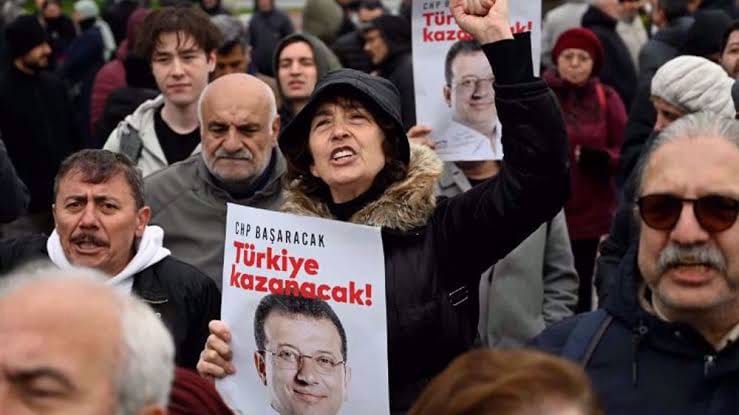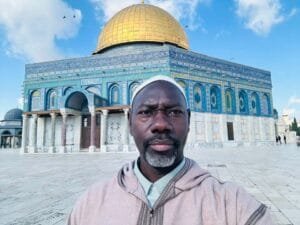Mass protests erupt in Turkey after Erdogan rival jailed
Tens of thousands of protesters have flooded the streets across Turkey after Istanbul Mayor Ekrem Imamoglu, the main challenger to President Recep Tayyip Erdogan, was arrested and charged with corruption.

File Source: Google
Tens of thousands of protesters have flooded the streets across Turkey after Istanbul Mayor Ekrem Imamoglu, the main challenger to President Recep Tayyip Erdogan, was arrested and charged with corruption. Imamoglu, who was expected to be the Republican People’s Party’s (CHP) presidential nominee for the 2028 elections, has called the charges politically motivated.

“I will never bow,” he wrote on X before being remanded in custody. His arrest on Sunday night triggered the most intense unrest Turkey has seen in over a decade, with police firing tear gas, rubber bullets, and water cannons at demonstrators. Riot police stood in formation as protesters, waving Turkish flags, gathered outside Istanbul’s city hall, chanting in defiance.
Dilek Kaya Imamoglu, the mayor’s wife, addressed the crowds, declaring that the “injustice” her husband faced had “struck a chord with every conscience.” Protests erupted in at least 55 of Turkey’s 81 provinces, marking the largest wave of demonstrations since the 2013 Gezi Park protests.
Imamoglu was among more than 100 politicians, journalists, and business figures detained in a corruption investigation. He was formally arrested on Sunday, facing charges of “establishing and managing a criminal organization, taking bribes, extortion, unlawfully recording personal data, and rigging a tender.” He has also been suspended as mayor, with Turkey’s interior ministry confirming his removal.
Despite his arrest, Imamoglu urged the public to continue protesting and vote in Sunday’s CHP nomination process. Through his lawyers, he sent a message on X late Sunday, praising the demonstrators and stating that voters had shown Turkey had “enough” of Erdogan. CHP officials said nearly 15 million people participated in the vote, though these figures could not be independently verified.
Erdogan condemned the demonstrations, accusing the opposition of trying to “disturb the peace and polarize our people.” The Ministry of Justice denied any political involvement, insisting on judicial independence.
Imamoglu’s arrest does not automatically disqualify him from running for president, but if convicted, he will be barred from the race. In a further blow, Istanbul University announced on Tuesday that it was revoking his degree due to alleged irregularities, which could disqualify him under Turkey’s constitutional requirement for presidential candidates to hold a university degree. His legal team vowed to appeal the decision at Turkey’s Constitutional Court and the European Court of Human Rights.
Adding to the controversy, X’s Global Government Affairs department revealed that Turkey’s communications regulator had ordered the platform to block over 700 accounts, including those of political figures and journalists. X objected, calling the move “not only unlawful” but a restriction on “millions of Turkish users from news and political discourse in their country.”
Meanwhile, prosecutors are seeking to charge Imamoglu with “aiding an armed terrorist organization,” though the court has not yet deemed it necessary. His CHP party has had an unofficial alliance with the pro-Kurdish Peoples’ Equality and Democracy Party (DEM), which has been accused—without evidence—of links to the Kurdistan Workers’ Party (PKK), a group designated as a terrorist organization by Turkey, the EU, UK, and US.
Since Imamoglu’s detention, more than 700 protesters have been arrested. Many demonstrators say their fight is not just about Imamoglu, but about democracy itself.
“I’m here for justice, I’m here for liberty. We’re free people, and Turkish people cannot accept this,” a woman dressed in black told the BBC. Another protester, who brought her 11-year-old son to the demonstrations, said she worried about his future. “It’s getting harder to live in Turkey day by day. We can’t control our lives, we can’t choose who we want, and there is no real justice here.”
With Erdogan unable to run in 2028 due to term limits unless he amends the constitution, Imamoglu had been seen as his most formidable challenger. The Supreme Election Council will ultimately decide whether he can remain a candidate, but with mounting legal battles and escalating protests, Turkey’s political landscape is more uncertain than ever.














